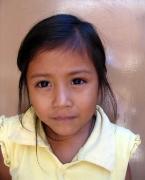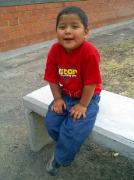Social welfare often does not reach the very poorest

Morelia is the capital of the Michoacán de Ocampo State in central Mexico and has a population approaching 700,000. Over 70 per cent of the local population are employed in the service sector – a large number of them informally, for example by selling merchandise on the streets. Social deprivation, poverty and marginalisation are some of the highest in the country in Morelia, and many children suffer from abuse and abandonment.
Rural poverty continues to be a big problem in the municipality, but more and more poor families are migrating to the city in search of a better life. This has led to thousands of families living in precarious conditions on the outskirts of Morelia. Unemployment amongst this sector of society is extremely high and many live in overcrowded conditions, lacking basic services such as sanitation or running water. Winters are cold here, and the makeshift shacks people live in provide no insulation and are cold and damp in wintertime; many people therefore suffer from respiratory illnesses, especially young children. Public welfare programmes often do not reach these illegal settlements.
Poverty and crime endanger the healthy development of countless children
It is common that children from the poorest families have to go out to work in order to help the family survive. More often than not, this leads to children dropping out of school because they lack the time to study or they work until late into the night. Working on the streets – for example shining shoes, washing windshields or selling merchandise – puts children in a highly vulnerable position. Not only are they in danger of being exposed to violence and exploitation, many of them also fall into the hands of organised crime groups. Without an education and engaged in criminal activities from a young age, these children have little hope of improving their situation in the future.
Organised crime and drug trafficking are, in fact, some of the biggest problems in the state of Michoacán. The La Familia Michoacana or LosCaballeros Templarios drug cartels, for example, are some of the fastest-growing and most violent in Mexico. Once again, young people and children – especially when they have lost parental care or are in danger of losing it – are most severely affected by the culture of violence these cartels create.
What we do in Morelia

SOS Children’s Villages began its work in Morelia in 2006 because there were no public institutions in the region that offered long-term care for children without parental care. The local government therefore donated a piece of land and asked SOS Children’s Villages to start a project here.
Family-based care: Up to 126 children from Michoacán who are no longer able to live with their parents can find a loving home in one of the 14 SOS families here. In each family, the children live with their brothers and sisters and are affectionately cared for by their SOS mother. They attend local nurseries and schools and are therefore very much integrated into the community.
Support for young adults: The high unemployment rate makes it difficult for young people to become independent. The SOS Youth Programme helps young people gain further training and supports them while they look for work.